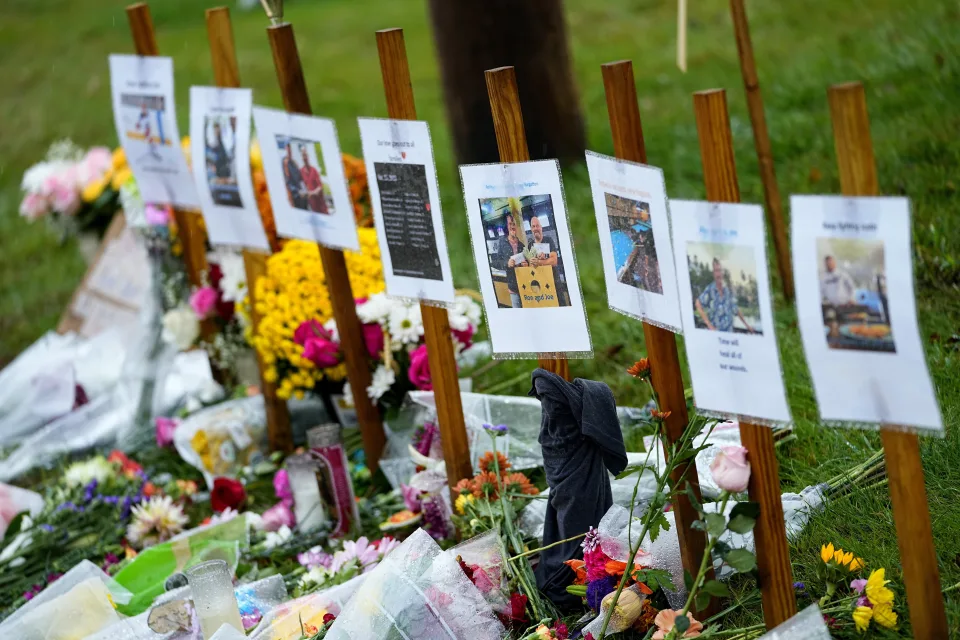PORTLAND, Maine (AP) — Three Army Reserve officers faced disciplinary action for dereliction of duty following an incident where a reservist killed 18 people in Maine, according to an Army report. The report highlighted significant communication failures within the chain of command and between military and civilian hospitals, among other issues.
Released on Tuesday, the report revealed “a series of failures by unit leadership,” stated Lt. Gen. Jody Daniels, chief of the Army Reserves. The administrative actions taken against the officers may impede their future military careers. The officers’ identities were not disclosed.
Survivors and victims’ families have criticized authorities for missing opportunities to prevent the attack that occurred in October 2023. They noted that the gunman had been exhibiting delusional and paranoid behavior months prior, which was observed by both family members and fellow reservists.
“My heart and thoughts are with all the families and witnesses affected by this tragedy,” Daniels told reporters. “We are doing our utmost to understand the events that transpired and to implement changes for the future.”
The partially redacted report indicated that the gunman, Sgt. 1st Class Robert Card, had previously sustained a head injury from a fall off a ladder, which was confirmed during a post-mortem examination. Daniels firmly stated that there was no connection between Card’s brain injury and his military service, despite the defense department investigating the potential effects of repeated blast exposure.
Amid a severe mental health crisis, the 40-year-old Card made disturbing statements prior to the shooting, according to the investigation. The findings revealed that Card had a “hit list,” boasted about the capability to kill 100 people with a rifle scope he had purchased, and informed a healthcare provider of his decision to quit his job “before he ended up killing someone.”
Both this investigation and an Army Inspector General report released on Tuesday highlight significant system failures, stated Travis Brennan, an attorney representing the families of the Lewiston victims.
“The reports clearly indicate numerous missteps leading up to this tragedy,” Brennan remarked. “There were multiple warning signs exhibited by the shooter before the incidents.”
The shooting occurred on October 25, 2023, at a bowling alley and a bar and grill in Lewiston. In addition to the fatalities, 13 individuals survived gunshot wounds and 20 others sustained non-shooting injuries. Card subsequently died by suicide.
An independent commission, established by Democratic Governor Janet Mills, is also investigating the tragedy, with its report expected to be completed later this summer.
Both the Army Reserves and the Army’s Inspector General were tasked with providing a comprehensive account of the events. The Army’s 115-page report, which includes interviews with 43 witnesses, 445 exhibits, and visits to the shooting sites and the location where Card’s body was found two days later, serves as a foundation.
The report recommends procedural changes and new policies to improve the management of reservists’ mental health. Its thoroughness led the Army’s Inspector General, Lt. Gen. Donna Martin, to conclude that an independent investigation by her office was unnecessary.
The Inspector General’s report, requested by the state’s congressional delegation, included its own recommendations and placed the responsibility for the tragedy squarely on Card.
“Our review identified several areas for improvement; however, our assessment concluded that even flawless execution by Army personnel in all identified areas would likely not have prevented the tragic events,” the report stated.
Republican Sen. Susan Collins mentioned that she and independent Sen. Angus King are collaborating to ensure that the military fully utilizes state crisis intervention programs while safeguarding the Second Amendment rights of military personnel.
The Army report highlighted failures in the Reserve unit’s leadership, communication lapses and delays between an Army hospital and a civilian psychiatric hospital in New York where Card was treated, and procedural shortcomings, including an inadequate review of Card’s medical records before his case was closed by the Army Reserve Psychological Health Program.
The report also recommended a thorough review of the U.S. Army Reserve’s behavioral health force structure and the implementation of comprehensive behavioral health retraining for the entire U.S. Army Reserves, which includes nearly 190,000 soldiers.
Individuals familiar with Card noted a shift in his behavior beginning in January 2023. In May 2023, Card’s ex-wife and son alerted police about his paranoia and erratic actions, just two months before his fellow reservists encountered a visibly gaunt Card in New York, where his unit was training West Point cadets.
Concerns about his behavior, including an attempted attack on a fellow reservist, led to Card being taken to an Army hospital for evaluation. Subsequently, he was transferred to a private psychiatric hospital for further treatment.
The report indicated that sufficient evidence was presented to commanders regarding Card’s deteriorating health, warranting his exclusion from training at West Point, where he was scheduled to work on the machine gun range. Additionally, upon hospitalization, Card should have maintained his on-duty status to ensure the Army could provide continuous care, the report stated.
However, Card was discharged after 19 days of psychiatric treatment and returned to Maine, where he was no longer on active duty and thus largely outside the jurisdiction of Army regulations.
A separate interim report from Maine’s independent commission found that law enforcement had the authority to confiscate Card’s weapons and should not have delegated this responsibility to his family.
